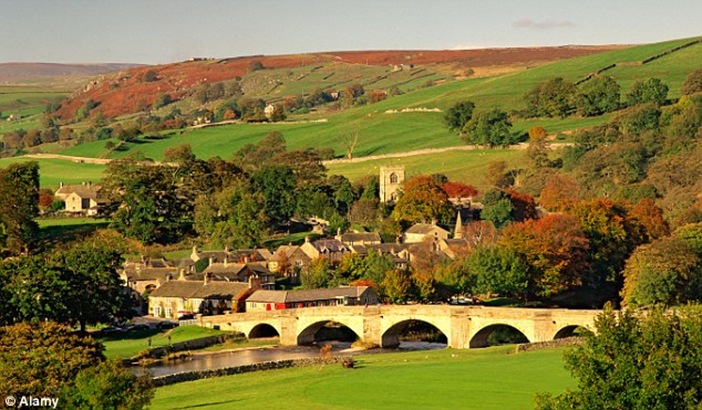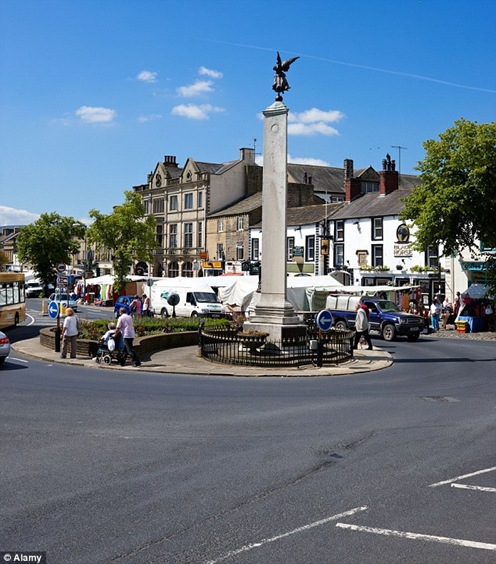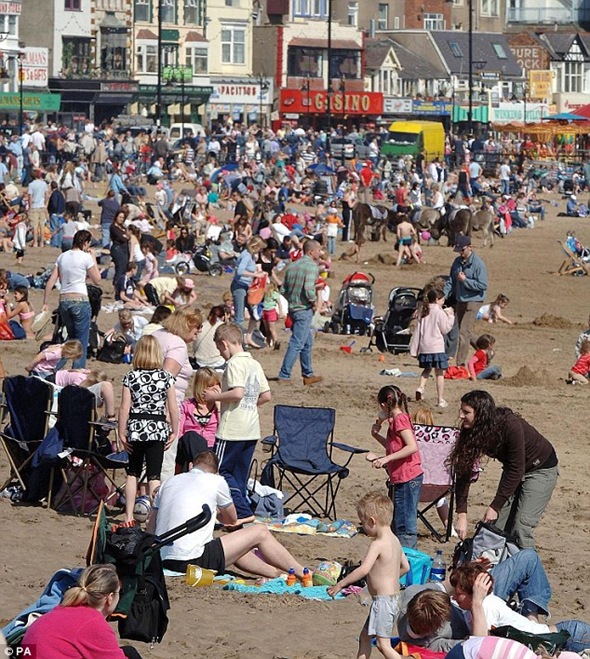Daily Mail
March 29, 2014

When I was a small boy, my mother gave me a piece of advice that has proved invaluable throughout my life. She told me I must never trust people from Derbyshire because their eyes were too close together.
This may seem a sweeping generalisation, but you have to realise that this was a time when we had highly developed geographical loyalty. We lived in Yorkshire, which meant every other county had all manner of failings, including insufficient space between the eyes.
Yes, I admit we were, beyond all doubt, guilty of being county-ist. Shamelessly, we mocked people from Lancashire, or any other non-Yorkist county, who had the effrontery to field a cricket team. Worse than that, we were townist, too.
The revelation in a survey this month that Skipton is the finest place in Britain to live would have come as no surprise to us. We’d always known it, even though we’d never been anywhere else.
Even then, we Skipton lads were quite sure that we had the edge on boys from nearby Barnoldswick, not to mention Ilkley. As for Kettlewell, it was no secret that their knuckles touched the ground as they walked.
And it got even more finely defined than that. Our fierce sense of identity was actually honed down to the street where we lived. So, those of us who were lucky enough to be Regent Roaders never doubted our superiority over Moor Roaders (even though, every November, they came and stole our bonfire, the little swines).
And those of us who lived at the top of Regent Road smiled a little pityingly on those who lived at the other end.
All this, I’m afraid, has changed. For I believe that mine is the last generation to take geographical loyalty seriously.
These days, no one much cares where you come from. And I think it’s a great loss that people no longer have that sense of pride in the patch of earth where they were born. Whole Army regiments were based on the belief that the Devon Yokels saluted more smartly than the Argyll and Sutherland Kilt-wavers. It was the basis of our entire social structure.
All that has gone now. For one thing, it’s deeply unfashionable — and possibly illegal — to claim you are in any way whatsoever better than the next bloke, street, town or country. This attitude lost its potency when everyone began moving away from their home towns.
When I was a boy, 60 years ago, people more or less stayed put. In my small market town, if you saw someone you didn’t know, you’d probably ring the police sergeant.
You’d grow up, get married, get a job, buy a house and be buried all within a bus ride of where you were born. I knew several older people who had never left the county and never would.
As old Harry, a plumber who was born and died in Skipton, explained to me: ‘Wherever tha goes, it won’t be a patch on Yorkshire, so why would tha want to go?’
This was a philosophy to which we all subscribed. You didn’t see many Pickfords removal vans up there, I can tell you.

Harry knew better than most. One year he did leave. His wife, Hilda Waterhouse, insisted that instead of going to Bridlington, Filey or Scarborough for their annual holiday, which entailed crossing no county boundaries, they should be more daring, strike out and go further afield to somewhere they’d never been before.
They did.
‘It were rubbish,’ said a disgusted Harry, when he got back. ‘Food were cr*p, you couldn’t tell what folk were saying and tha couldn’t get a decent cup of tea.’
He shook his head at the memory. ‘No, they won’t get me going to Morecambe again.’ Morecambe, I should explain, is in the neighbouring county of Lancashire.
There you are, you see. Like pioneers crossing the Rockies, he’d struck out across the Pennines, but instead of California, he’d found himself in Morecambe.
You can see his point.
How did everything change? I’m partly to blame, as one of the first to start this mass migration. As I got older, the urge to see fresh fields got worse. Aged 19, barely out of short trousers, I left the street, the town and (may the Lord, a Tyke himself, forgive me) the county.
Then, at 20, I moved to London. In Skipton, with six O-levels, I was regarded as pretty sophisticated. In London, as soon as I spoke, people fell down laughing and said: ‘Ayup, it’s Wilfred Pickles.’
One Londoner said you could always recognise the mayor of a Northern town because he’d be the man with more ballpoint pens in his breast pocket. Equally, many Northerners believed you had to question the sexuality of any man who pronounced ‘bath’ as ‘barth’.
Of course, this was in the Fifties, a time when the backcloth to our lives was being hastily repainted.
National Service meant lots of young men went off to places with strange names. Families were beginning to go abroad for holidays once they realised you could get a fortnight in Spain for the price of a night in Morecambe.
Once the foreign resorts added the All-day Great Bellybuster British Breakfast, Tetley’s ale and a dartboard, why stay close to home? My own travels took me to the Midlands, Tyneside, Halifax, Manchester, Derbyshire, Maida Vale, Primrose Hill, Chelsea and now West Sussex. The result was that our three children were each born in very different places.
Sarah was born in Radford Semele — a small village on the edge of Leamington Spa, in Warwickshire. Becky entered this world in the village of Heddon-on-the-Wall, overlooking the Tyne Valley, in Northumberland.
And son Matt’s first view from his cot was of the Swizzel sweet factory in New Mills, in the Derbyshire dales. Now in their 30s, I doubt, sadly, if any of them could point to their birthplace on the map.

